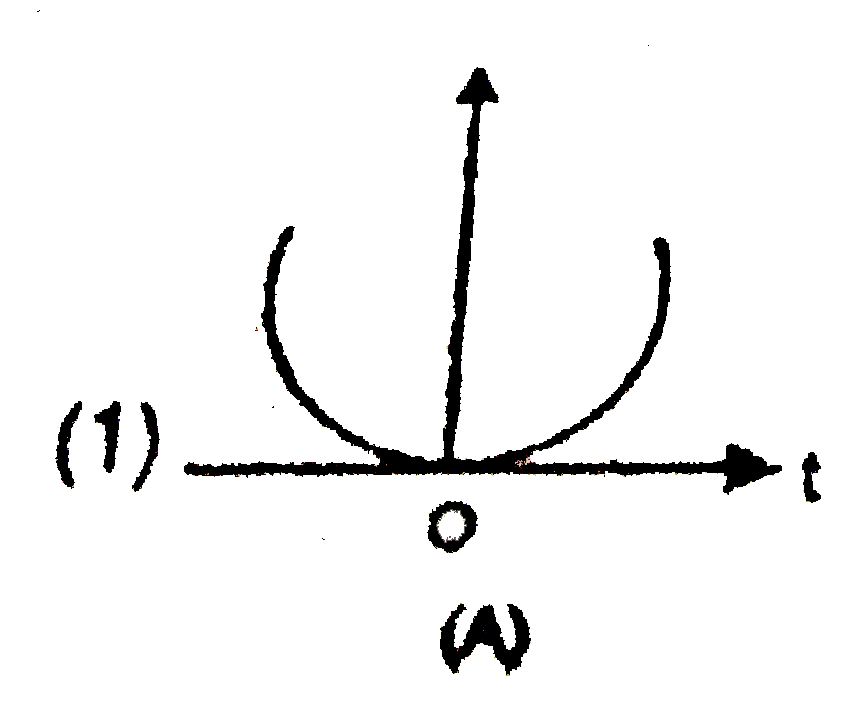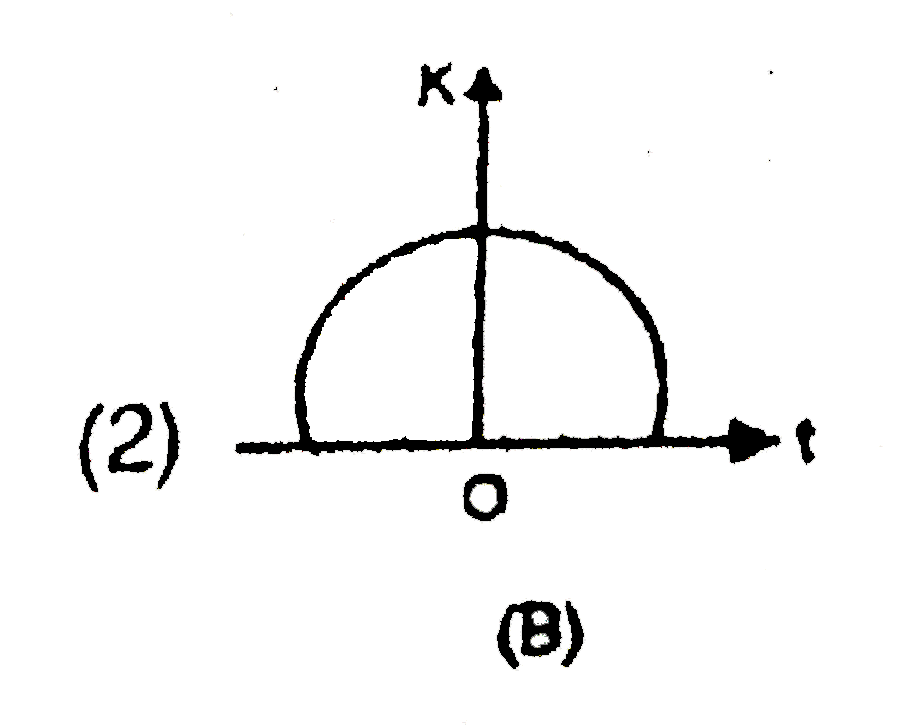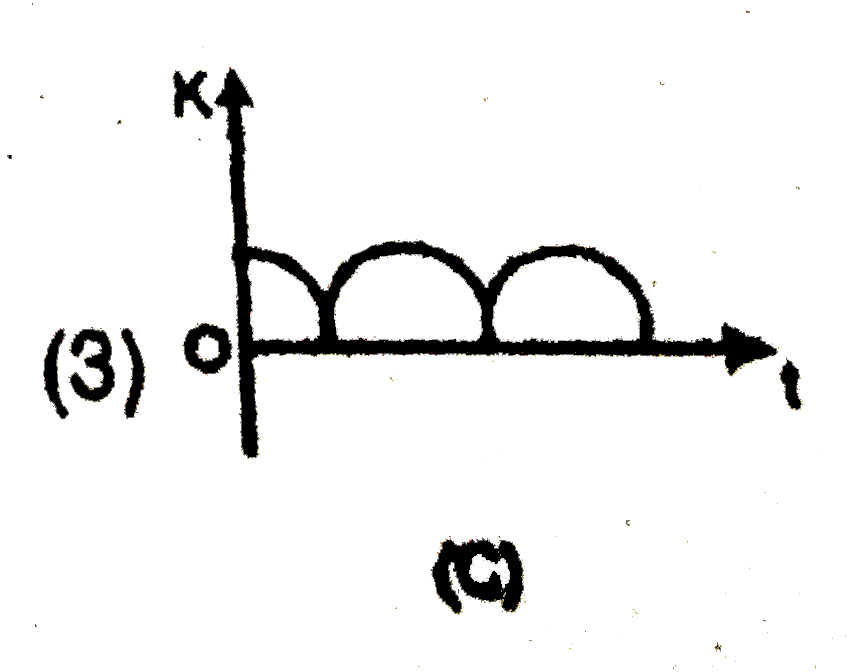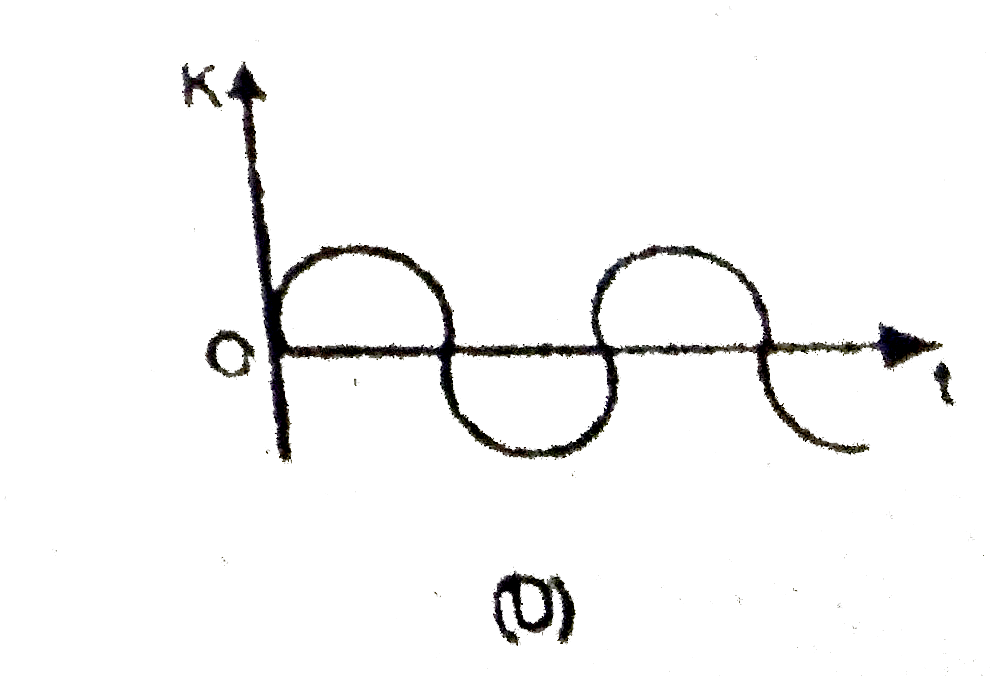For a body executing S.H.M. :
(a) Potential energy is always equal to its K.E.
(b) Average potential and kinetic energy over any given time inteval are always equal.
(c ) Sum of the kinetic and potential energy at any point of time is constant.
(d) Average K.E in one time period is equal to average potential energy in one time period . Choose the most approprate ooption from the options given below :
only (c )
only (b)
(b) and (c )
(c ) and (d)
The correct Answer is:D
To solve the question regarding the properties of a body executing Simple Harmonic Motion (S.H.M.), we need to analyze each statement provided:
1. Understanding the Definitions:
- In S.H.M., a body oscillates about an equilibrium position, and its energy can be divided into kinetic energy (K.E.) and potential energy (P.E.).
- The total mechanical energy (E) in S.H.M. is constant and is the sum of kinetic and potential energy at any point in time.
2. Evaluating Statement (a):
- Statement: Potential energy is always equal to its K.E.
- Analysis: This is incorrect. At different positions in S.H.M., the potential energy and kinetic energy can vary. They are equal at specific instances (like at the mean position), but not always.
- Conclusion: False.
3. Evaluating Statement (b):
- Statement: Average potential and kinetic energy over any given time interval are always equal.
- Analysis: This is also incorrect. The average kinetic and potential energies over a random time interval can differ. They are equal only over a complete cycle (one time period).
- Conclusion: False.
4. Evaluating Statement (c):
- Statement: Sum of the kinetic and potential energy at any point of time is constant.
- Analysis: This statement is true. The total mechanical energy (E) is constant and is given by E=K.E+P.E. Thus, at any point in time, the sum remains constant.
- Conclusion: True.
5. Evaluating Statement (d):
- Statement: Average K.E. in one time period is equal to average potential energy in one time period.
- Analysis: This statement is correct. Over one complete cycle of S.H.M., the average kinetic energy is equal to the average potential energy due to the symmetry of the motion.
- Conclusion: True.
Final Answer:
The correct statements are (c) and (d).
- In S.H.M., a body oscillates about an equilibrium position, and its energy can be divided into kinetic energy (K.E.) and potential energy (P.E.).
- The total mechanical energy (E) in S.H.M. is constant and is the sum of kinetic and potential energy at any point in time.
- Statement: Potential energy is always equal to its K.E.
- Analysis: This is incorrect. At different positions in S.H.M., the potential energy and kinetic energy can vary. They are equal at specific instances (like at the mean position), but not always.
- Conclusion: False.
- Statement: Average potential and kinetic energy over any given time interval are always equal.
- Analysis: This is also incorrect. The average kinetic and potential energies over a random time interval can differ. They are equal only over a complete cycle (one time period).
- Conclusion: False.
- Statement: Sum of the kinetic and potential energy at any point of time is constant.
- Analysis: This statement is true. The total mechanical energy (E) is constant and is given by E=K.E+P.E. Thus, at any point in time, the sum remains constant.
- Conclusion: True.
- Statement: Average K.E. in one time period is equal to average potential energy in one time period.
- Analysis: This statement is correct. Over one complete cycle of S.H.M., the average kinetic energy is equal to the average potential energy due to the symmetry of the motion.
- Conclusion: True.
The correct statements are (c) and (d).
Topper's Solved these Questions
- BOOK - JEE MAINS PREVIOUS YEARCHAPTER - JEE MAINS 2021EXERCISE - Physics Section B20videos
JEE MAINS 2021
- BOOK - JEE MAINS PREVIOUS YEARCHAPTER - JEE MAINS 2021EXERCISE - Physics (Section A)81videos
JEE MAINS 2021
- BOOK - JEE MAINS PREVIOUS YEARCHAPTER - JEE MAINS 2021EXERCISE - PHYSICS30videos
JEE MAINS 2021
- BOOK - JEE MAINS PREVIOUS YEARCHAPTER - JEE MAINS 2020EXERCISE - PHYSICS246videos
JEE MAINS 2020
- BOOK - JEE MAINS PREVIOUS YEARCHAPTER - JEE MAINS 2022EXERCISE - PHYSICS (SECTION -B)10videos
JEE MAINS 2022
Similar Questions
Knowledge Check
- Question 1 - Select One
For a body its elastic potential energy is equal to
A12×stress×strainB12×stress×strain×volume of the bodyC12×stress×strain×area of the bodyD12×stress×strain×volume of the body - Question 2 - Select One
In SHM for how many times potential energy is equal to kinetic energy during one complete period
A1B2C4D8 - Question 3 - Select One
In S.H.M., the graph between kinetic energy K and time 't' is
A B
B C
C D
D
Fill In the blanks:
__ is the sum of kinetic energy and potential energy.View SolutionShow that for a particle in linear S.H.M., the average kinetic energy over a period of oscillation equals the average potential energy over the same period.
View SolutionA particle excutes SHM, at what value of displacement are the kinetic and potential energies equal?
View SolutionIn a period of oscillating particle, the number of times kinetic energy and potential energy are equal in magnitude is
View SolutionFor a particle executing S.H.M., the kinetic energy K is given K=K0cos2ωt. The maximum value of potential energy is:
View Solution

